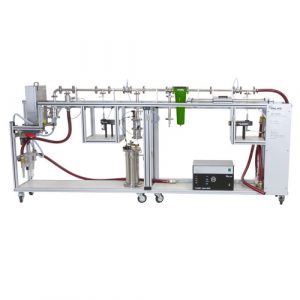Description
The Palas LFT 3000 is a latest generation automatic leakage scan testing system for testing HEPA & ULPA filters in accordance with ISO 29463-4 & ISO 29463-5. To ensure filter quality, ISO 29463-1 requires that all HEPA /ULPA filters with an efficiency of 99.95% or higher (ISO 35H/H13) be tested for the following:
- Local efficiency according to ISO 29463-4
- Overall efficiency according to ISO 29463-5
The Palas LFT 3000 combines the requirements from the ISO standard with simple operations and a fast test run. It operates computer-controlled with appropriate software to perform the test and to detect possible leakage points easily and quickly. In addition to the local filter efficiency, the overall efficiency is also part of the test report.

Operation Principle
The test system consists of the following components:
- Supply air duct with volume flow measurement and raw gas sampling
- Horizontal filter holder (adapter for different filter sizes)
- Aerosol generator and dilution on the raw gas side
- Scanning system with sampling and integrated particle counters
- Control and evaluation unit including Windows based software
First, the intake air flows through the built-in filter at a defined volume flow rate. During the process, the particle counter measures the particle concentration and size on the raw gas side. One advantage of the Palas LFT 3000 system is that the test parameters for the test object are automatically calculated from the specifications of the filter class and the associated volume flow. The settings and sequence are stored and can be recalled at any time for repeat measurements.
Subsequently, the pressure drop is recorded by scanning over the filter surface. The scan system, which is installed on the outlet side uses the particle counter to measure the local emission and size of the particles in the gas. From this, it then calculates the local filter efficiency. The results ensure leaks are detected quickly and easily.

Leak detection with the indication of the position of the leak after successful testing of the local filter efficiency. The overall filtration efficiency is calculated from the local values, and the test report is generated.
Key Benefits
- Quick manual scanning with an optical particle counter
- Test report
- Clear leak detection
- Easy installation of filter elements
- Adapters for various filter dimensions
- Up gradable to an automatic scanning system
- Use of components for ISO 14644 In-situ integrity testing
Applications
- Classification of HEPA / ULPA filters
- Filter testing to ISO 29463-4, ISO 29463-5
Accessories
- Aerosol Generation – We recommend the Palas PLG 2100H with a Laskin nozzle for the greatest possible consistency in aerosol generation
- Particle Measurement – We recommend an optical particle counter with a 28 LPM flow rate, measurement range selectable either from 0.1µm or 0.3µm
- Scan Nozzle – Specially designed according to ISO 29463 for scanning speeds up to 10cm/s
- Scan Unit – A fast traversing system with linear driver captures the entire filter area




